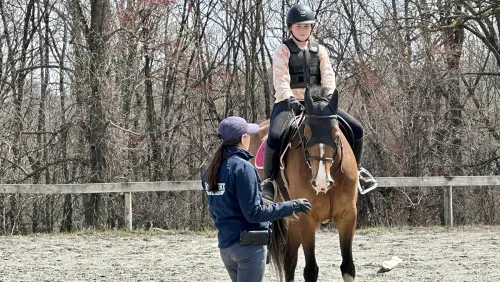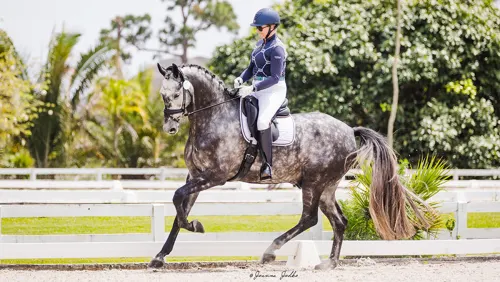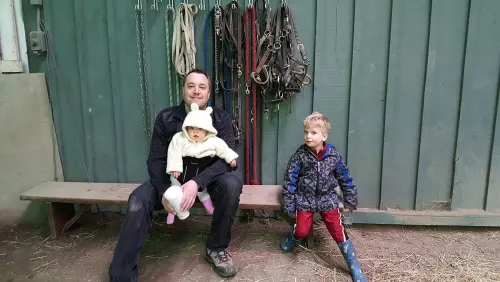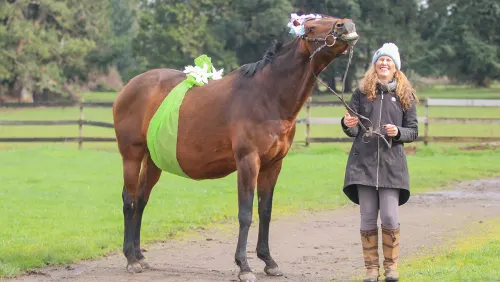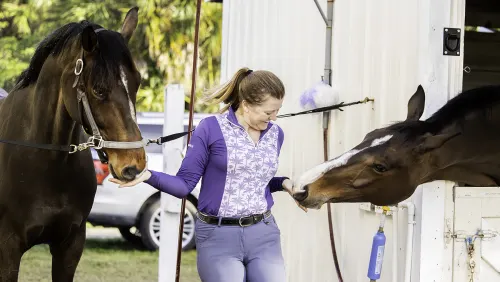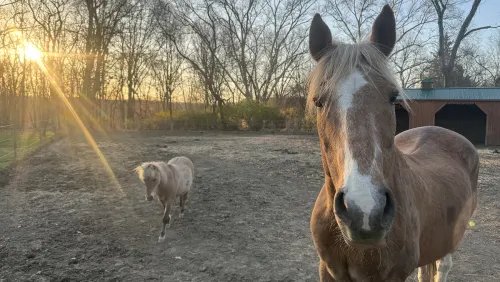There’s a girl here at the barn who’s riding a client’s horse, a 7- or 8-year-old who was a real success at the lower levels, and now as she moves him up she’s contending with a pretty major self-carriage issue. The previous rider of the horse had him really “broken” farther back down his neck, and so she’s spending a few weeks with him, as she joked, “like he’s in the English Pleasure class”—neck way up, poll the highest point and nose well, well in front of the vertical. It’s not the long term strategy, of course. It’s to break the cycle, to build some different skills, different muscle memory. She’s had the ride on him for a very short period of time, and she’s got to make it work.
But she said the funniest thing. The ring here is right by the road, and there are no trees or bushes to shelter it from passing eyes. And she said, “I wish I could put a sign around my neck that says, ‘I didn’t train this one. I’m just working with what I’ve got. Cut me some slack.’ “
I’ve had the same thought. I don’t know where the idea came from, the idea that training is a linear process, that good riders can take a good horse from beginning to end without one awkward ride, without one growing pain, and that everyone who encounters a problem is clearly doing something egregiously wrong.
And that idea, that judgment is one thing. The talk, the gossip? That’s another.
We’ve all seen and heard it. Ringside at the show, talking about how someone’s horse looked so much better last year, or how they’re not ready to move up to this level, or they’re TOO qualified for that level. An amateur rider who, clearly, is buying her way up the levels. What a lucky chump. That trainer’s taking that owner for all she’s worth, making that owner think that horse will ever be suitable for her; the trainer obviously just wants the ride for himself. Or when something goes wrong… well, clearly it’s because the trainer’s an incompetent ass.
I’ll be the first one to tell you that I’m guilty of it, sometimes. It’s easy to let your green-eyed monster slip out to friends, and it’s a coping mechanism. This is a frustrating line of work sometimes, and we’re all only human. But while sometimes what you see is what you’ve got—when horse after horse from one trainer stands up in the ring, or goes with the poll 10 feet too low, or has spur and whip marks, that either is the story or it’s the worst string of luck in the world—very rarely is what you see on the surface the whole story.
ADVERTISEMENT
Maybe the horse looked better last year because this year the rider’s in financial trouble and can’t take as many lessons. Maybe they’re at the level they’re at because the horse had an injury, or because they’re answering to an owner, and juggling that relationship can be so hard. The amateur rider who’s “buying her way up the levels” is actually buying a trained horse to learn from, something that makes a lot of sense, and by doing so is contributing to the careers of her trainer, and that of the person who sold her the schoolmaster. And maybe that owner, the one whose trainer is showing the horse instead of her, isn’t misguided—she’s owning that horse for that trainer, to help that trainer out. Maybe she just likes owning horses and doesn’t want to ride, really. Maybe she’s having to tell a little fib to a spouse.
Maybe, just maybe, there’s more to the story, and it’s none of our business.
Coveting thy neighbors’ goods is capitalism. Seeing a peer get a great opportunity lights a fire under my butt, to improve my own riding, to get my ducks in a row for when my opportunity comes along. But life with horses, as an amateur, as a professional, as someone on the top of his game or the absolute bottom, is so hard as it is. Anyone who thinks waltzing onto a trained horse is easy is mistaken. Anyone who thinks that every horse, in the right hands, can go Grand Prix in a towel and a piece of baling twine is insane.
And the people who love those horses have lives, families, careers, hip arthritis, fears, expenses and dwindling bank accounts. Nothing happens in a vacuum, nor is anything perfect in its progress from beginning to end. There’s a time in the life of everything that works when it doesn’t work. Sometimes that’s what we see, in the ring, driving by the arena from the road. And green-eyed monsters aside, I want to be able to stop those petty thoughts before they come out of my mouth, and remember to cut other riders the same slack I hope they give me when I need it. As cheap as talk is, we could probably all spend a little less on it, and a little more on putting our heads down (or, sometimes, up) and getting to work.







